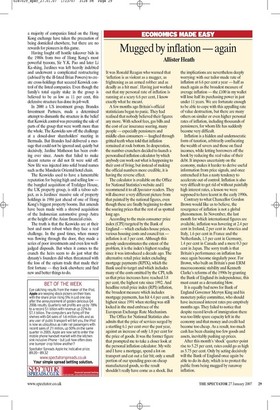Mugged by inflation again
Allister Heath It was Ronald Reagan who warned that 'inflation is as violent as a mugger, as frightening as an armed robber and as deadly as a hit man'. Having just worked out that my personal rate of inflation is running at a scary 6.6 per cent, I know exactly what he meant.
A few months ago Britain's official statisticians began to panic. They had realised that nobody believed their figures any more. With school fees, gas bills and the cost of car insurance soaring, many people — especially pensioners and middle-class consumers — laughed through gritted teeth when told that inflation remained at rock-bottom. In desperation, the number-crunchers decided to launch a personalised inflation calculator by which anybody can work out what is happening to their cost of living; but instead of making the official numbers more credible, it is having the reverse effect.
The calculator is available on the Office for National Statistics's website and I recommend it to all Spectator readers. They will discover a very different picture from that painted by the national figures, even though these are finally beginning to show the soaring prices that the rest of us spotted long ago.
According to the main consumer price index (CPI) targeted by the Bank of England — which excludes house prices, various housing costs and council tax — inflation is at 3 per cent. Although this grossly underestimates the extent of the problem, it is the index's highest reading since it was introduced a decade ago. The alternative retail price index excluding mortgage payments (RPIX), which the Bank used to target and which includes many of the costs omitted by the CPI, tells us that price increases have reached 3.8 per cent, the highest rate since 1992. And headline retail price index (RPI) inflation, the broadest measure which includes mortgage payments, has hit 4.4 per cent, its highest since 1991 when sterling was still locked in the mad embrace of the European Exchange Rate Mechanism.
The Office for National Statistics also admits that the price of services surged by a startling 6.1 per cent over the past year, against an increase of only 1.8 per cent for the price of goods. It was the former figure that prompted me to take a closer look at the personal inflation calculator. My wife and I have a mortgage, spend a lot on transport and eat out a fair bit; only a small portion of our spending goes on cheap manufactured goods, so the result shouldn't really have come as a shock. But the implications are nevertheless deeply worrying: with our tailor-made rate of inflation at 6.6 per cent a year — half as much again as the broadest measure of average inflation — the £100 in my wallet will lose half its purchasing power in just under 11 years. We are fortunate enough to be able to cope with this appalling rate of value destruction, but there are many others on similar or even higher personal rates of inflation, including thousands of pensioners, for whom life has suddenly become very difficult.
Inflation is a hidden and undemocratic form of taxation, arbitrarily confiscating the wealth of savers and those on fixed incomes, while letting borrowers off the hook by reducing the real value of their debt. It imposes uncertainty on the economy, makes it harder to derive useful information from price signals, and once entrenched it has a nasty tendency to accelerate out of control. Inflation is also very difficult to get rid of without painfully high interest rates, a lesson we were supposed to have learnt in the early 1990s.
Contrary to what Chancellor Gordon Brown would like us to believe, the resurgence of inflation is not a global phenomenon. In November, the last month for which international figures are available, inflation was hovering at 2.4 per cent in Ireland, 2 per cent in America and Italy, 1.6 per cent in France and the Netherlands, 1.5 per cent in Germany, 1.4 per cent in Canada and a mere 0.3 per cent in Japan. The sorry truth is that Britain's performance on inflation has once again become singularly poor. For Brown, who built on Britain's post-ERM macroeconomic stability and Kenneth Clarke's reforms of the 1990s by granting the Bank of England its independence, this must count as a devastating blow.
It is equally bad news for Bank of England Governor Mervyn King and his monetary policy committee, who should have increased interest rates pre-emptively months ago. They failed to notice that despite record levels of immigration there was too little spare capacity left in the economy and that money and credit had become too cheap. As a result, too much cash has been chasing too few goods and assets, inevitably pushing up prices.
After this month's 'shock' quarter-point rise to 5.25 per cent, rates could go as high as 5.75 per cent. Only by acting decisively will the Bank of England once again be able to do its duty, which is to protect the public from being mugged by runaway inflation.














































 Previous page
Previous page